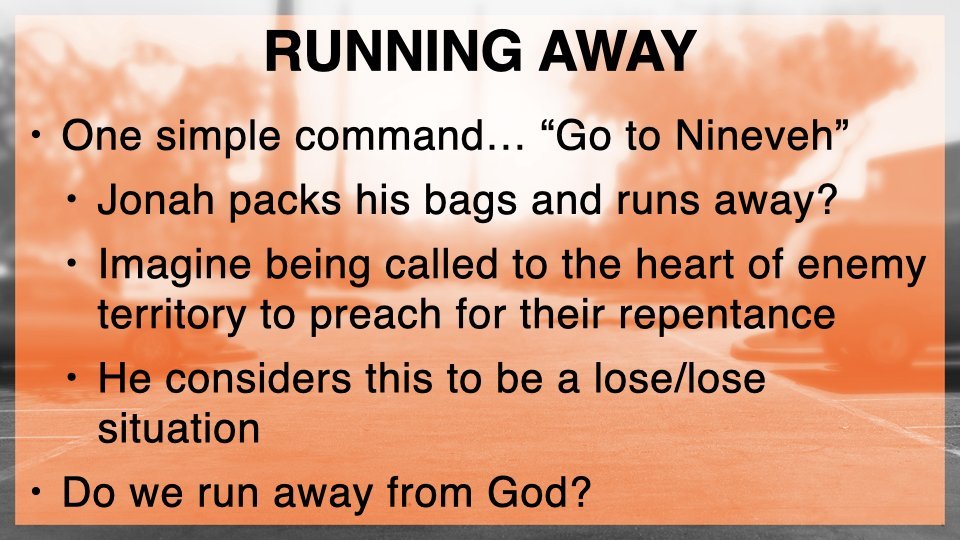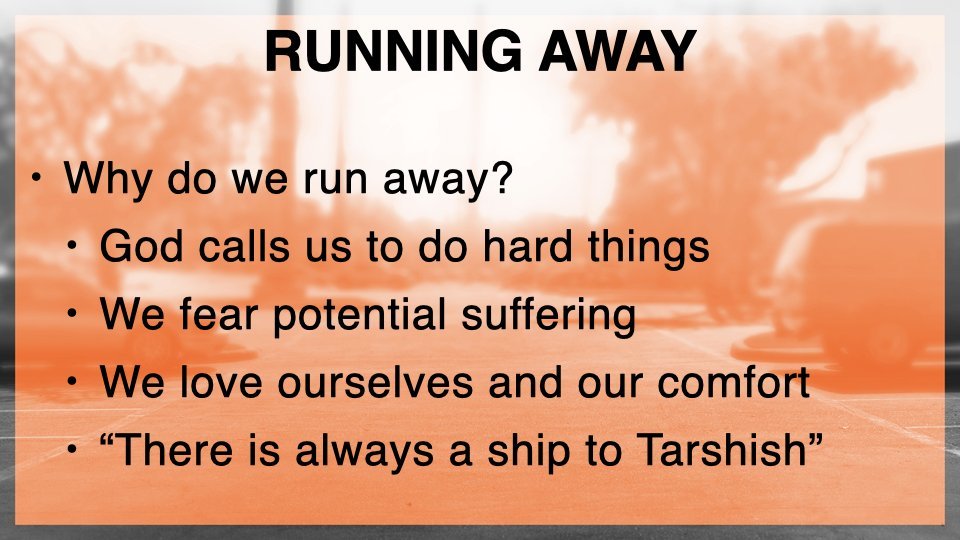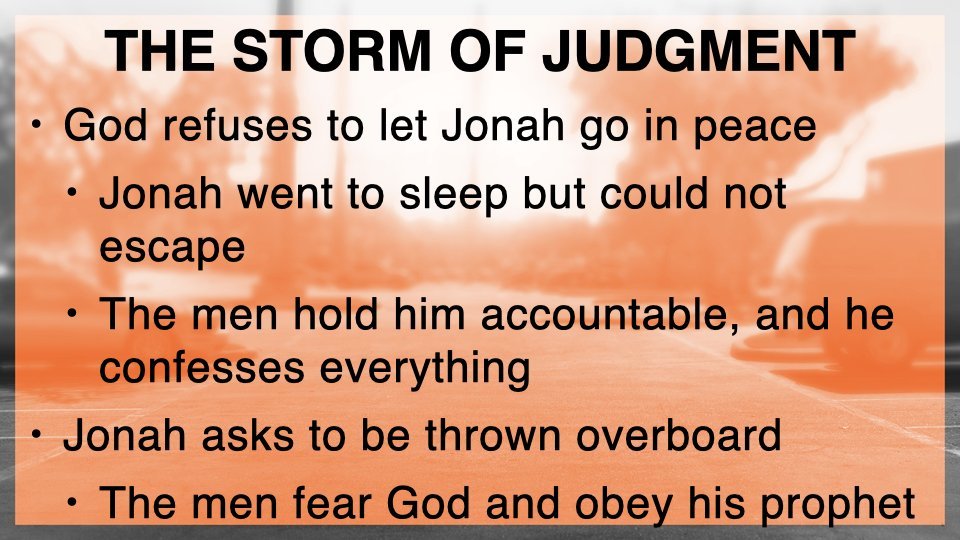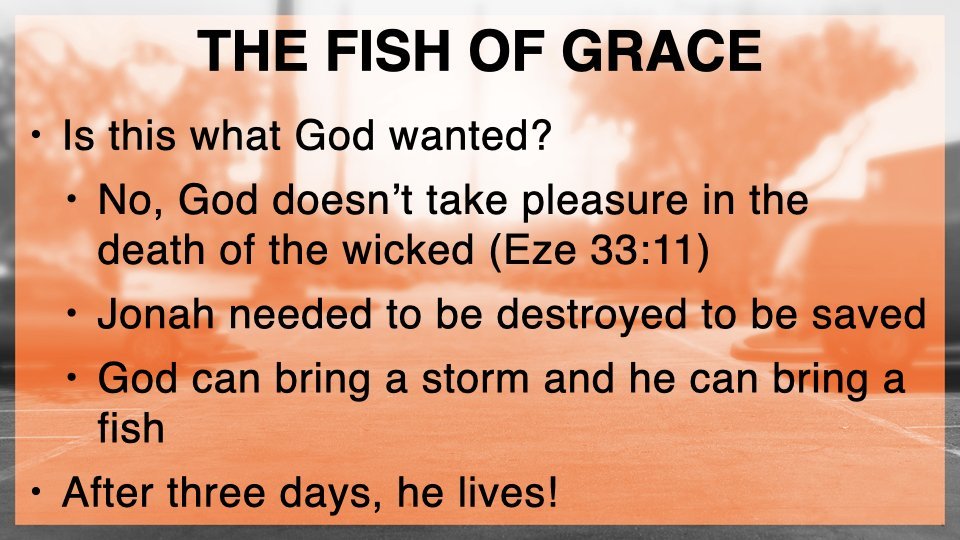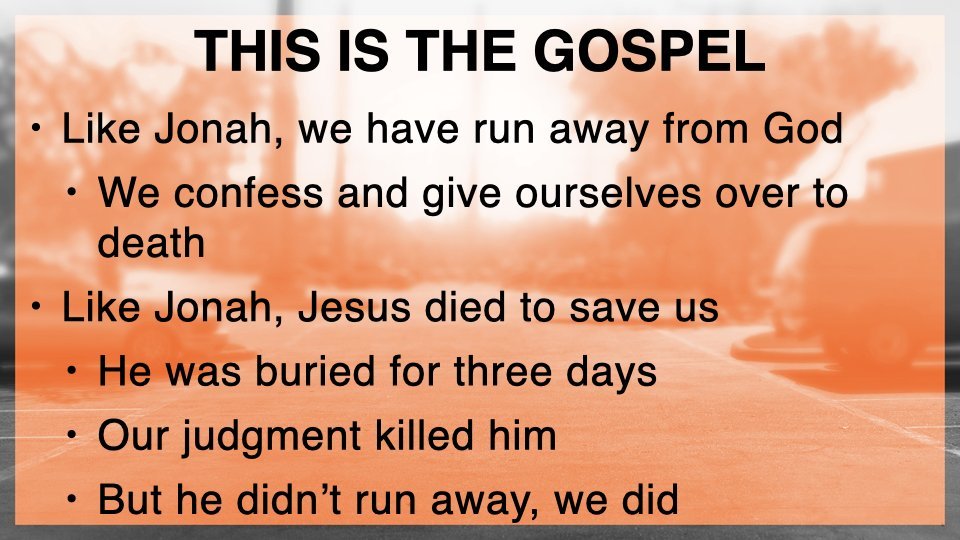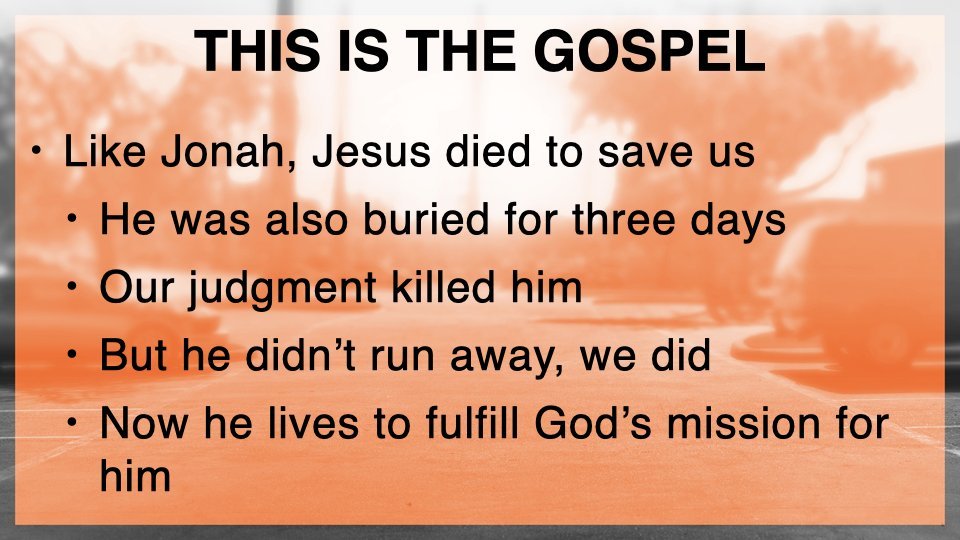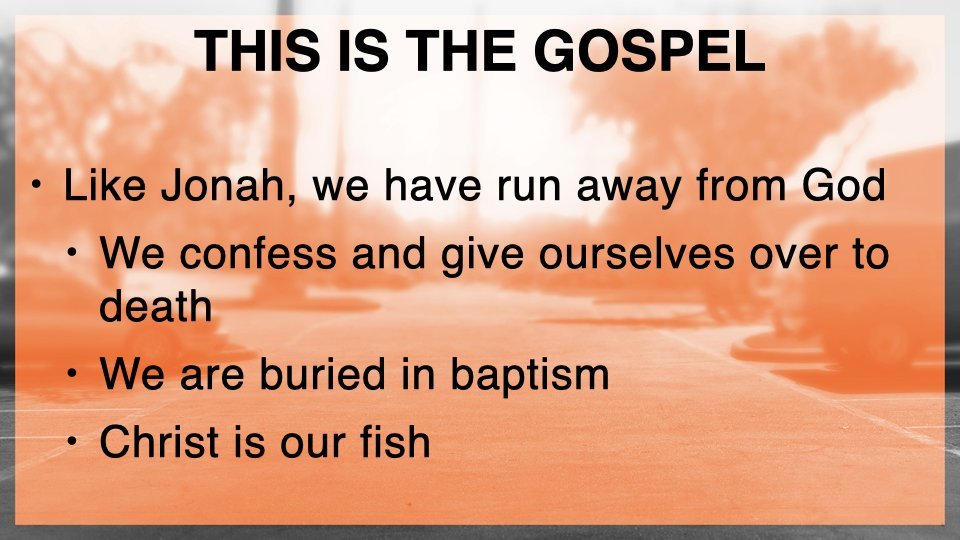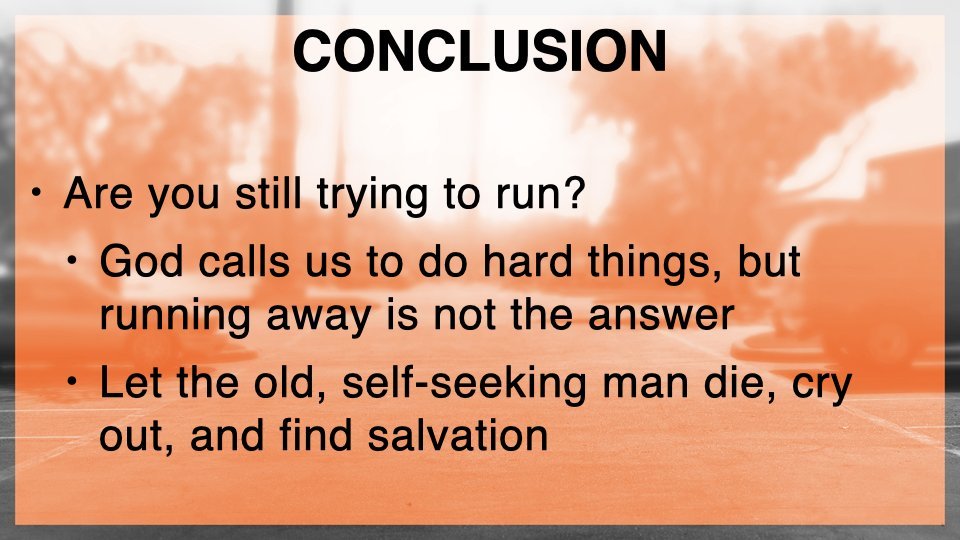The Runaway (Jonah 1)
Our story begins with a command from God. One simple command.
Jonah 1:1--2 (ESV) --- 1 Now the word of the Lord came to Jonah the son of Amittai, saying, 2 “Arise, go to Nineveh, that great city, and call out against it, for their evil has come up before me.”
God wants Jonah to leave Israel and travel to Nineveh, the capital of Assyria. As God's prophet, we expect Jonah to pack his bags and head toward Nineveh. But he doesn't.
Running Away
Jonah 1:3 (ESV) --- 3 But Jonah rose to flee to Tarshish from the presence of the Lord. He went down to Joppa and found a ship going to Tarshish. So he paid the fare and went down into it, to go with them to Tarshish, away from the presence of the Lord.
Jonah packs his bags and travels to the other side of the world. He learns of a ship heading to Tarshish, and he hops on. This choice is shocking. We don't hear of prophets disobeying God throughout the Bible. They always shine as lights of obedience. The only other instances where an actual prophet disobeys God are the young prophet who is deceived by the old prophet and possibly Elijah, who was scared and discouraged because of the evil of Israel. I wouldn't call either rebellious.
What is going on in Jonah's mind? Why would he run away from Nineveh? He is effectively handing in his resignation letter. He says, "I don't want to be your prophet anymore." Isn't this astounding? This is his life's work. We read in 2 Kings 14:23-27 that Jonah was a successful prophet for Israel. He helped the king and the kingdom to endure some tough times. Why would he give that up?
Can you imagine being a preacher here and then being told to go to Afghanistan or Iran to proclaim that they must repent and submit to Christ? That's not an easy move to make. There is almost a guarantee of pain and suffering in that command. He doesn't want to go to the evilest and merciless civilization on the planet and speak to them.
Later on, in Jonah 4:2, we learn that Jonah considered this a lose/lose situation. On the one hand, he could go to Nineveh and be killed by those evil people. On the other hand, and perhaps worse in his mind, he could go and bring about their repentance. In Jonah's mind, the destruction of an enemy is better than the turning of an enemy to be an ally.
Do We Run Away?
So Jonah runs away. But isn't this a picture on a larger scale of what is happening to us on a smaller scale? How do we respond to a problematic command from God? Maybe we don't get on an airplane or a ship and go somewhere else physically, but do we leave spiritually? Maybe we still want to be connected to God, but we don't want to give him everything. Perhaps we stop attending gatherings as regularly or stop praying and reading so much. It could be that we stop talking about religion so much or stop interacting with our brethren as often. We distance ourselves from God, hoping the separation will allow us to avoid suffering.
In the book of Hebrews, we read a constant encouragement. He says, "Draw near." Jesus has prepared you for a close relationship with God so you can draw near to him. But when our hearts desire something other than God's commands, we separate ourselves from him.
Why do we run away from God? We sometimes do this to relieve ourselves from the suffering we know obedience will bring. God calls us to do hard things and be transformed from who we used to be. It takes work. He also calls us to evangelize to evil people and wants us to show people love who might not love us in return. Sometimes we run away from God because we still love ourselves. We are proud of what we have accomplished and think too much of ourselves. Sometimes, we forget that everything we have was given to us by God, and we fear losing it. We believe we can keep it by separating ourselves from God or getting more by drawing nearer to the world.
I like what Tim Keller said in his sermon about this. He said, "There are always ships going to Tarshish." One of the reasons why we disobey and turn to the world is that the world is constantly making it easy for us to disobey. The world entices us to leave God and tells us it's possible to "escape God's presence." They want us to believe we can rebel against God and live, but that's not true.
The Storm of Judgment
Let's read the chapter and see what happens to Jonah.
Jonah 1:3--16 (ESV) --- 3 But Jonah rose to flee to Tarshish from the presence of the Lord. He went down to Joppa and found a ship going to Tarshish. So he paid the fare and went down into it, to go with them to Tarshish, away from the presence of the Lord. 4 But the Lord hurled a great wind upon the sea, and there was a mighty tempest on the sea, so that the ship threatened to break up. 5 Then the mariners were afraid, and each cried out to his god. And they hurled the cargo that was in the ship into the sea to lighten it for them. But Jonah had gone down into the inner part of the ship and had lain down and was fast asleep. 6 So the captain came and said to him, “What do you mean, you sleeper? Arise, call out to your god! Perhaps the god will give a thought to us, that we may not perish.” 7 And they said to one another, “Come, let us cast lots, that we may know on whose account this evil has come upon us.” So they cast lots, and the lot fell on Jonah. 8 Then they said to him, “Tell us on whose account this evil has come upon us. What is your occupation? And where do you come from? What is your country? And of what people are you?” 9 And he said to them, “I am a Hebrew, and I fear the Lord, the God of heaven, who made the sea and the dry land.” 10 Then the men were exceedingly afraid and said to him, “What is this that you have done!” For the men knew that he was fleeing from the presence of the Lord, because he had told them. 11 Then they said to him, “What shall we do to you, that the sea may quiet down for us?” For the sea grew more and more tempestuous. 12 He said to them, “Pick me up and hurl me into the sea; then the sea will quiet down for you, for I know it is because of me that this great tempest has come upon you.” 13 Nevertheless, the men rowed hard to get back to dry land, but they could not, for the sea grew more and more tempestuous against them. 14 Therefore they called out to the Lord, “O Lord, let us not perish for this man’s life, and lay not on us innocent blood, for you, O Lord, have done as it pleased you.” 15 So they picked up Jonah and hurled him into the sea, and the sea ceased from its raging. 16 Then the men feared the Lord exceedingly, and they offered a sacrifice to the Lord and made vows.
As we read the rest of the story, we learn that God pursued Jonah. He could have just let him leave and accepted his resignation, but he didn't. He brought a storm after Jonah. Jonah wanted relief from the command and potential suffering, but God brought him suffering anyways. It says, "The Lord hurled a great wind upon the sea." The image is that God threw this wind at Jonah to destroy him. He can bring judgment against those who rebel against him. There is no escaping God's judgment. But it didn't destroy him immediately.
Notice what Jonah does when the wind and waves start to pick up. He runs into the bottom of the ship and falls asleep. Do you see how Jonah wants to ignore his problems? He doesn't want to face the facts. But God has come for him, and he will not be able to avoid this storm. The men on the ship go down and get him. They hold him accountable, and he confesses everything. Jonah faces reality as he sees his sin has brought suffering to others. He feels the weight of his sin, acknowledges God's power, and tells the men to throw him into the sea.
As soon as Jonah is thrown overboard, the sea rests. That means that God only wanted to destroy Jonah. He didn't have any issues with the other men. They end up fearing and believing in God, going so far as to make vows to him. This judgment worked out for their good. But Jonah was destroyed. Is that what God wanted?
No. God had to destroy Jonah. He had to take everything away from him to shake him back to reality. God's violence is intended to shake his rebellious prophet and bring him back to him. Sometimes we need a storm to rock us free from what has us.
The Fish of Grace
God's storm of judgment allows Jonah to experience the depths of hopelessness. He needed this. Because when he is at his lowest point, God can save him. God didn't bring judgment against Jonah because he wanted to destroy his prophet. He takes no pleasure in the death of the wicked.
Ezekiel 33:11 (ESV) --- 11 Say to them, As I live, declares the Lord God, I have no pleasure in the death of the wicked, but that the wicked turn from his way and live; turn back, turn back from your evil ways, for why will you die, O house of Israel?
God can send the storm, but he wants to send the fish! Even in the final moments of Jonah's life, God responds by sending the fish. He saves Jonah. Jonah's confession and humbling opened the door for grace. So he gets to spend three days in the belly of the fish and eventually be brought back to life so he can fulfill God's plan for him.
This Is The Gospel
As we hear this story, aren't we reminded of someone else? Someone else spends three days in the "belly of the fish." Jesus died and was in the tomb for three days. But he didn't rebel. He didn't die because God was punishing him for his sin. He died because we punished him for his righteousness. The motives are opposite, and the judge is us, but the event is typological of Christ. Jesus was brought out of the tomb like Jonah, and he fulfilled what God had in mind, preaching repentance to the rebellious.
There is another parallel. We are also reminded of ourselves. Like Jonah, we have all run away from God. We were like everyone else in the world, darkened in the futility of our minds. We tried to escape God's judgment, but we were faced with the truth. If you are in Christ, you have to be thrown overboard. You had to come to nothing. All of your wants and wishes were given up. Our bodies and our lives were given over to death. Like Jonah, we were buried in the waters of baptism. Then, Jesus swallowed us up. He spits us out and calls for us to fulfill our calling to be in God's image.
Conclusion
Have you made this confession, or are you still trying to escape the presence of God? If you aren't in Christ, I pray that God gives you a storm that helps you see your hopeless situation. I don't want you to suffer, but I want you to know your hopeless state, confess it, and cry out for God in the depths of your despair so that Jesus can bring you the salvation you need. I hope you will put to death the old self-seeking man and become what you were created to be in Christ.
If you have already gone through that but are rebelling again, please recognize that God only blesses you in obedience. There may be suffering, but there will always be a blessing from God for those who love him and resist rebellion. Are you distancing yourself from the calling and gifting God has for you? There is a purpose for all of us in the Body of Christ. Running away from that is not going to give you the best life. It will lead to destruction if you persist. There is always a ship to Tarshish, but we must stay away and draw near to God. He will, in turn, draw near to us!


